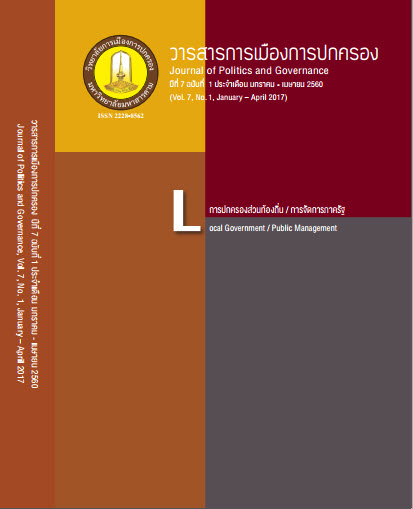Expansion in the Thai Public Bureaucracy Under Sarit Regime: Decisive Security and Development Era 1958 – 1973
Main Article Content
Abstract
This study is a modest attempt trying to define and illustrate the pattern of the Thai public bureaucracy’s expansion behavior during the Sarit Regime. Under the period of ‘development era’ (1958 – 1973), Thailand was continually ruled by the military leaders which was later viewed by many scholars as the height of ‘Bureaucratic Polity’. Under Sarit Regime with his State Security and National Development Council, there appeared several new agendas and policies of the government which consequently defined the new roleห of the state. Development programs and other state activities led to the expansion of the Thai bureaucracy both in term of quality and quantity. New ministries, new departments and ad hoc agencies were established for engaging and implementing the new functions. Based on this observation, the behavior of the Thai bureaucracy during this period immensely impacts and shapes the key characters of the Thai bureaucracy as we have known today. This study tries to explore and understand the nature of this expansion period. By adopting the New Institutionalism perspective, it will address several research questions by describing the roles of several key actors and their interactions as well as the institutional contexts that might possibly affected and shaped the Thai state mechanisms. The results of this study reveals that the pattern of expansion behavior was a product of interactions among key political and administrative actors which tried to established their own domains. The new departments and agencies were the autonomous empires of these actors which had to be protected. And this behavior happened not only in the administrative mechanisms but also within the realm of the military. It means that the increasing new state functions which led to the expansion behavior were hugely shared by the military. Civilian activities such as infrastructure, community and rural development, and others were also done by the military. Even if there was an explanation that the bureaucratic polity in Thailand began in 1932 but many key characters of it’s just clearly emerged during the Sarit Regime.
Article Details
References
กุลลดา เกษบุญชู มี๊ด. (ม.ป.ป.). การเมืองไทยในยุคสฤษดิ์ – ถนอม ภายใต้โครงสร้างอำนาจโลก. กรุงเทพฯ : ภาควิชาความสัมพันธ์ระหว่างประเทศ คณะรัฐศาสตร์ จุฬาลงกรณ์มหาวิทยาลัย.
กุลลดา เกษบุญชู มี้ด. (2550). การเมืองไทยในยุคสฤษดิ์-ถนอมภายใต้โครงสร้างอำนาจโลก. กรุงเทพฯ : ทุนนิธิปรีดี พนมยงค์ มูลนิธิ 50 ปี ธนาคารแห่งประเทศไทย.
เจมส์ ซี. อินแกรม. (2552). การเปลี่ยนแปลงทางเศรษฐกิจในประเทศไทย 1850 – 1970. กรุงเทพฯ : มูลนิธิโตโยต้าประเทศไทย.
ชัยอนันต์ สมุทวณิช. (2535). 100 ปี แห่งการปฏิรูประบบราชการ : วิวัฒนาการของอำนาจรัฐและอำนาจการเมือง. กรุงเทพฯ : โครงการเผยแพร่ผลงานวิจัย ฝ่ายวิจัยจุฬาลงกรณ์มหาวิทยาลัย.
ทักษ์ เฉลิมเตียรณ. (2548). การเมืองระบบพ่อขุนอุปถัมภ์แบบเผด็จการ พิมพ์ครั้งที่ 2. กรุงเทพฯ : โรงพิมพ์มหาวิทยาลัยธรรมศาสตร์.
นิธิ เอียวศรีวงศ์. (2552). ต้นร่าง (ตุ๊กตา) ประวัติศาสตร์ไทยสังเขป : ข้อเสนอสังเขป ประวัติศาสตร์แห่งชาติ.
ประมวลประกาศและคำสั่งของคณะปฏิวัติที่ใช้เป็นกฎหมาย พร้อมทั้งธรรมนูญการปกครองราชอาณาจักร และ พ.ร.บ.จัดระเบียบราชการสำนักนายกรัฐมนตรี พ.ศ.2502. (2503). พระนคร: สำนักพิมพ์ก้าวหน้า.
ผาสุก พงษ์ไพจิตรและคริส เบเกอร์. (2546). เศรษฐกิจการเมืองไทยสมัยกรุงเทพฯ พิมพ์ครั้งที่ 3. กรุงเทพฯ : ซิลค์เวอร์ม.
รังสรรค์ ธนะพรพันธุ์. (2532). กระบวนการกำหนดนโยบายเศรษฐกิจในประเทศไทย : บทวิเคราะห์เชิงประวัติศาสตร์เศรษฐกิจการเมือง พ.ศ. 2475 – 2530. กรุงเทพฯ : สมาคมสังคมศาสตร์แห่งประเทศไทย.
วรเดช จันทรศร. (2543). การขยายตัวของหน่วยงานในระบบราชการไทย : ปัญหา อุปสรรค และแนวโน้ม พิมพ์ครั้งที่ 4. กรุงเทพฯ : สมาคมนักวิจัยมหาวิทยาลัยไทย.
วรเดช จันทรศร. (2536). การปรับปรุงและปฏิรูประบบบริหารราชการแผ่นดินของไทย พิมพ์ครั้งที่ 2. กรุงเทพฯ: ห้างหุ้นส่วนจำกัด สหายบล็อกและการพิมพ์.
March, James G. and Johan P. Olsen. (1989). Rediscovering Institution: The Organizational Basic of Politics. New York : The Free Press.
Muscat, R.J. (1966). Development strategy in Thailand, a study of economic growth New York: F.A. Praeger.
Peters, B. Guy. (2005). Institutionalism Theory in Political Science : The New Institutionalism 2nd ed. London : Continuum.
Peters, Guy B. and Donald J. Savoie, eds. (1995). Governance in a Changing Environment. Canada : Centre for Management Development.
Peters, B. Guy and Jon Pierre ed. (2007). Institutionalism Volume 1. Los Angleles : Sage Publication.
Peters, B. Guy and Jon Pierre ed. (2007). Institutionalism Volume 3. Los Angleles : Sage Publication.
Pollitt, Christopher & Geert Bouckaert. (2000). Public Management Reform. New York : Oxford University Press.
Riggs, W., Fred. (1966) Thailand; the Modernization of a Bureaucratic Polity. Honolulu: East-West Center Press.
Siffin, J., William. (1966). The Thai Bureaucracy: Institutional Change and Development. Honolulu: East-West Center Press.
Toonen, A.J., Theo. (2003) Administative Reform : Introduction in Peters, B., Guy and Jon Pierre, eds. Handbook of Public Administration London : Sage.
Wilson, David A. (1962). Politics in Thailand. USA : Cornell University Press.
บทความวารสาร
ณัฐพล ใจจริง. (2554). กำเนิดระบอบประชาธิปไตยแบบอำนาจจำกัด : ปฏิสัมพันธ์ระหว่างสถาบันทางการเมืองในระบอบประชาธิปไตยไทย 2475 – 2490. ฟ้าเดียวกัน ปีที่ 9 ฉบับที่ 1, กรุงเทพฯ : ฟ้าเดียวกัน, น. 117 – 137.
วสันต์ เหลืองประภัสร์. (2556). สองคลื่นแห่งการปฏิรูประบบราชการไทย:15 ปีของความเปลี่ยนแปลงในเชิงสถาบันทางการเมือง-การบริหารไทย 2535 - 2549, คณะรัฐศาสตร์ มหาวิทยาลัยธรรมศาสตร์.
อรรถจักร์ สัตยานุรักษ์. (2542). รากฐานความคิดทางการเมืองสมัยจอมพลสฤษดิ์ ธนะรัชต์. ใน ธเนศ
วงศ์ยานนาวา (บก.), รัฐศาสตร์สาร ปี 21 ฉบับ 1. กรุงเทพฯ : คณะรัฐศาสตร์ มหาวิทยาลัยธรรมศาสตร์.
Hooley, Richard. (1976). The Contribution of Technocrats to Development in Southeast Asia. Asian Survey Vol. 16, No. 12, 1160 – 1161.
Lande, Carl H. (1976). Technocrats in Southeast Asia : A Symposium : Introduction. Asian Survey Vol. 16, No. 12, 1151 – 1155.
Stifel, Laurence D. (1976). Technocrats and Modernization in Thailand in Asian Survey Vol.16 No.12, University of California Press.
Toru Yano. (1963). Sarit and Thailand's ‘Pro-American Policy'. The Developing Economies 6, 284-299.
วิทยานิพนธ์
อุกฤษฏ์ ปัทมานันท์. (2526). สหรัฐอเมริกากับนโยบายเศรษฐกิจไทย (1960 - 1970). วิทยานิพนธ์รัฐศาสตร์บัณฑิต ภาคความสัมพันธ์ระหว่างประเทศ บัณฑิตวิทยาลัย ได้รับการตีพิมพ์, จุฬาลงกรณ์มหาวิทยาลัย.
Voradej Chandarasorn. (1985). Patterns of Organizational Expansion in the Thai Public Bureaucracy : A Study Agencies’ Functional Responsibilities, 1969 – 1982. A dissertation in the Department of Public Administration submitted to the faculty of the Graduate School of Arts and Science in partial fulfillment of the requirements for the degree of Doctor of Philosophy at New York University.
Wasan Luangprapat. (2008). Public Sector Reform in Thailand : Causes and Consequences. Ph.D. Dissertation, Kobe University.
ระเบียบและกฎหมายต่างๆ
ประกาศกระทรวงพัฒนาการแห่งชาติ เรื่อง แต่งตั้งผู้อำนวยการทางหลวงจังหวัดตามพระราชบัญญัติทางหลวง พุทธศักราช 2482 ประกาศ ณ วันที่ 21 มิถุนายน พ.ศ. 2506.
ประกาศคณะปฏิวัติ ฉบับที่ 3 ประกาศ ณ วันที่ 20 ตุลาคม พ.ศ. 2501.
ประกาศคณะปฏิวัติ ฉบับที่ 8 ประกาศ ณ วันที่ 20 ตุลาคม พ.ศ. 2501.
ประกาศคณะปฏิวัติ ฉบับที่ 33 ณ วันที่ 5 ธันวาคม พ.ศ.2501.
ประกาศคณะปฏิวัติ ฉบับที่ 218 ลงวันที่ 29 กันยายน พ.ศ. 2515
พระราชกฤษฎีกาแบ่งส่วนราชการกรมทางหลวง กระทรวงพัฒนาการแห่งชาติ พ.ศ. 2506.
พระราชกฤษฎีกาแบ่งส่วนราชการกรมชลประทาน กระทรวงพัฒนาการแห่งชาติ พ.ศ. 2506.
พระราชบัญญัติจัดตั้งกระทรวง ทบวง กรม พ.ศ. 2476.
พระราชบัญญัติจัดระเบียบราชการสำนักนายกรัฐมนตรี พ.ศ. 2502.
พระราชบัญญัติปรับปรุงกระทรวง ทบวง กรม พ.ศ. 2545.
พระราชบัญญัติระเบียบข้อราชการพลเรือน (ฉบับที่ 3) พ.ศ. 2499.


